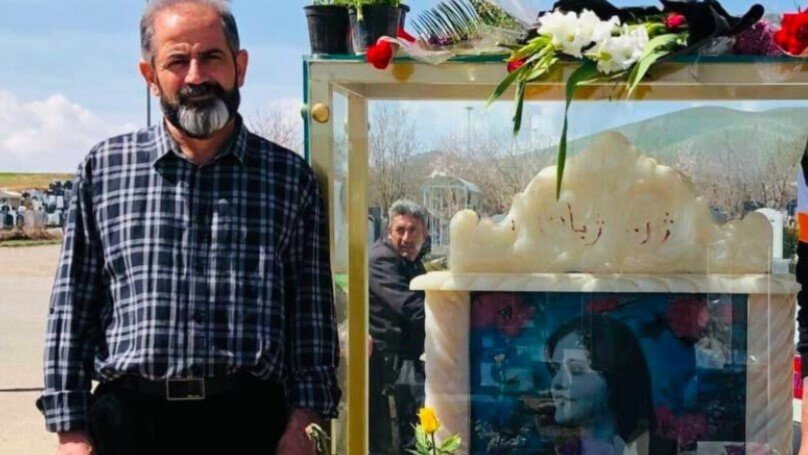The family of Mahsa Amini have reportedly been placed under house arrest on the second anniversary of the death of the 22-year old Iranian Kurdish woman, as a strike is enforced in various cities to protest her killing.
Amini died after being taken into custody for wearing her hijab “inappropriately” in September 2022, sparking off widespread demonstrations across Iran against the country’s treatment of women and minorities, as well as against the Islamic Republic as a whole.
On Friday, her father said that he and others would hold a vigil at Amini’s gravesite in the western city of Saqqez to mark the anniversary if the authorities allowed them.
According to Kurdish news outlet RojNews, however, he and his wife were placed under house arrest, while the route to the cemetery was blocked off and security forces deployed throughout the city.
“By walking a little in the streets, you will feel that the atmosphere of the city is not normal, and the police forces can be clearly seen in high numbers in the city,” said 26-year-old Ehsan, a resident of Saqqez.
New MEE newsletter: Jerusalem Dispatch
Sign up to get the latest insights and analysis on Israel-Palestine, alongside Turkey Unpacked and other MEE newsletters
He told Middle East Eye that many of the shops around the city were closed off or on strike to commemorate Amini’s death, while fireworks had been set off over the weekend.
Compared to the first anniversary, however, he said security was lighter and the authorities seemed “less concerned” with the potential for protest.
The protests in 2022 rocked the Islamic Republic and provoked a fierce response. At least 551 people were killed according to rights groups, while thousands more were arrested.
‘Things have changed that will never be the same again – women have become braver and I don’t think the mandatory hijab will be enforced like before’
– Ehsan, resident of Saqqez
Ten men have been executed by the Islamic Republic in cases related to the protests, most recently Gholamreza Rasaei, who was convicted of killing a member of the Islamic Revolutionary Guard Corps (IRGC) and hanged in August.
Despite the repression of the demonstrators, the impact of the protests is still being felt in Iran, most notably with the increasing numbers of women appearing in public without a headscarf in defiance of the laws.
The election in July of President Masoud Pezeshkian, a reformist candidate who criticised both the death of Amini and the subsequent crackdown, also raised hopes that the state could relax its enforcement of the compulsory hijab.
Ehsan said that in Saqqez there were broadly two minds on the subject: “The first group who hope that the situation will improve and the second group who are confident that nothing will change with the change of president.
“Things have changed that will never be the same again – women have become braver and I don’t think the mandatory hijab will be enforced like before.”
‘People have their own rules’
In the run-up to the anniversary, many businesses across the provinces of Kurdistan and West Azerbaijan shut up shop in protest. The cities of Saqqez, Sanandaj, Divandarreh, Mahabad and Bukan took part in the action.
Kawsar Fattahi, a senior member of the left-wing, pro-Kurdish Komala party said it had been involved in organising the industrial action in Iranian Kurdistan.
“The Iranian regime is vulnerable now because the only tool that they had was suppression which is now as weak… people are no longer scared of the regime,” she told Middle East Eye.
Fattahi, who in 2014 fought the Islamic State group in Iraq as a Peshmerga commander, said the “Women, Life, Freedom” protest movement sparked by Amini’s killing had changed the culture in Iran and eroded the gender “apartheid” imposed on women in the country.
“It wasn’t just a political movement that had the aim and object of changing the regime but was also a cultural revolution, a social revolution that achieved its aim, because the streets after the Women, Life, Freedom revolution are changed, the people are changed – people are different, people have their own rules,” she said.
Following the original outbreak of the protests in 2022, the Islamic Republic blamed Kurdish political parties based in Iraq for stoking the uprising and launched air strikes at several of them, including Komala.
They also accused Amini and her family of being members of Komala and fighting on their behalf – something Fattahi said was untrue.
“They have some sympathy for Komala, but they are not our formal members, they are normal people,” she said.
“Why did the regime try to spread it about? Because there’s a fight between the regime and Komala, because they think we are the most effective inside [Iranian] Kurdistan.”

